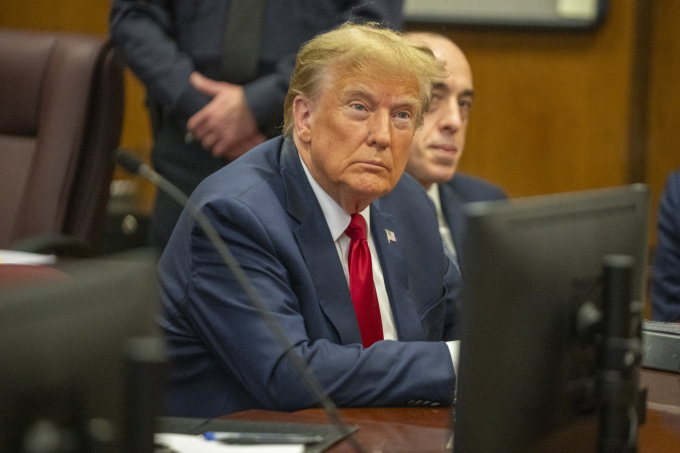While appealing two civil lawsuits in New York, Donald Trump may have to sell some of his shares and real estate to pay a fine of more than $438 million.
In just a few weeks, former US President Donald Trump has been hit with two major financial penalties. On February 16, a New York judge ordered him to pay $355 million and banned him from operating a business or borrowing from banks in the state for three years, for allegedly illegally inflating his assets to obtain favorable bank loans or insurance policies.
On January 26, a New York jury concluded that Mr. Trump must pay former journalist E. Jean Carroll $83.3 million in compensation for repeatedly publicly making malicious comments aimed at her.
The two civil cases have cost the former president an estimated $438 million, and that’s just a fraction of the penalties he could face in other lawsuits. The two large fines in New York account for nearly a sixth of Trump’s estimated net worth of $2.6 billion, according to Forbes .

Former President Donald Trump at Manhattan Criminal Court, New York, February 15. Photo: AFP
Mr. Trump said he would appeal both cases, but he would have to pay the fines while he waits for the outcome of the appeals. The penalties accrue interest annually at 9%. The appeals process could take months, even years.
If Trump refuses to pay, he could be held in contempt of court and face additional fines. New York authorities could also seek to seize his assets in the state to enforce the judgment. If he successfully appeals, the fines will be refunded.
$438 million is a large sum, but it is unlikely to force Mr. Trump to declare bankruptcy. "A billionaire like Donald Trump could pay a million dollars a day for 10 years and still have money in the bank. It has to be the maximum penalty," said Roberta Kaplan, an attorney for former journalist Carroll.
Mr. Trump could pay all in cash, or put up a smaller amount with collateral and interest, but it would be difficult to secure sureties due to concerns about the former president’s legal troubles. A ban on bank loans or business licenses in New York could also severely limit his ability to raise cash.
In 2023, Mr. Trump said he had more than $400 million in cash, but Forbes said he invested most of that in bonds and treasury bills, with a smaller amount in stocks and mutual funds. To pay the fine, Mr. Trump may have to sell most of these investments.
He could also sell his real estate holdings. In 2023, he sold a golf course in the Bronx. In 2022, he sold the Old Post Office building in Washington, which was later converted into a hotel. Court documents show that the 2022 sale netted Trump $131.4 million before taxes.
He could also cash in on his stake in the social media platform Truth Social, which has seen its stock soar since Trump ran for president this year. The former president’s stake in Trump Media & Technology, which owns Truth Social, is estimated to be worth about $4 billion.

Mr. Trump at a campaign event in South Carolina, USA, February 14. Photo: AFP
Mr. Trump has stepped up his fundraising efforts because of his legal troubles. However, federal law prohibits candidates from using campaign funds for personal purposes. The two lawsuits in New York are not related to his campaign or to his status as president or a political candidate.
But the AP reported in October that his Save America PAC spent $37 million on legal fees, more than half of its total spending. Trump was the top fundraiser of any Republican candidate in the fall of 2023, raising $45.5 million in the third quarter of last year.
Duc Trung (According to Guardian, Reuters, Forbes )
Source link







































































































Comment (0)